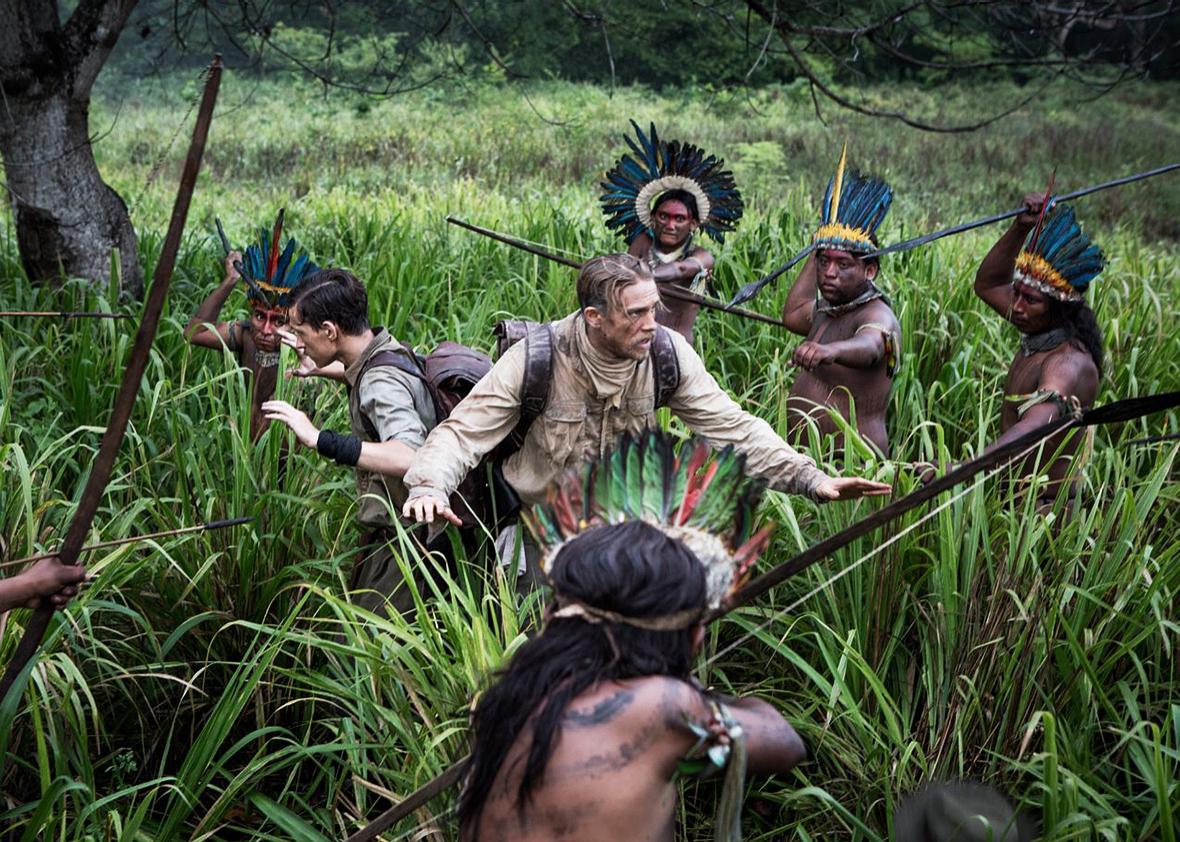The opening scene of The Lost City of Z is a spectacular action sequence. It’s 1905, and British army officers are chasing a stag through the verdant, undulating Irish countryside. Hounds bay, horses tumble, and riders hit the ground with spectacular thunks. Everyone is brave, but one man separates himself from the pack. Literally. Ignoring frantic warnings that no paths have been cleared through the forest through which the buck threatens to escape, Percy Fawcett (Charlie Hunnam) charges through the dense woodland anyway and finds himself alone with his quarry. He brings it down with one sure shot. Fawcett’s peers celebrate his bravery, his horsemanship, and his marksmanship, but at the regimental dinner that evening, he isn’t invited into the inner sanctum with the most senior officers, an honor usually extended to the fellow who kills the stag. Fawcett was “unfortunate in his choice of ancestors,” one officer explains. Fawcett can only watch as his luckier colleagues head off to a private supper.
Soon after, Fawcett is summoned to the London offices of the Royal Geographical Society, whence he is dispatched to an unexplored (by Europeans) region of the Amazon. Conditions on the expedition are dire—if the river doesn’t kill Fawcett’s team, the native tribes might. Once again, Fawcett’s exceptionalism reveals itself. Physically, he is able to withstand much more than other men—while even his boon companions Henry Costin (Robert Pattinson) and Arthur Manley (Edward Ashley) are subject to plagues of boils, bug bites, and whatever pestilence might cause a human being to cough up great globs of blood, Fawcett seems immune. By sheer force of will, his depleted party completes its assigned task, though that achievement is overshadowed by another tantalizing discovery—scattered clues that point to the existence of a once-mighty civilization, which Fawcett dubs the Lost City of Z. He becomes convinced that finding Z is his destiny as well as his path to restoring his family name.
When Fawcett presents his findings to the RGS back in Britain, emphasizing the anthropological glories of Z, his skeptical colleagues assume he has lost his reason, deriding him for believing that “savages” are capable of creating complex societies without white men showing them how. But Fawcett is a woke Edwardian who reveres the natives he meets on his travels. He’s not above “hiring” an Indian slave to guide his expedition—without one the journey is doomed to fail—but the Indian is treated no worse than the rest of Fawcett’s team.
The problem is, Percy Fawcett is too good to be true. In the book on which the movie is based, journalist David Grann paints Fawcett as a man out of time, but in the movie, surrounded by mere mortals full of foibles and faults, he reads as a middle-class Übermensch. An unparalleled physical specimen, a fearless explorer, the bravest officer at the Somme, a loving husband and father, a manly man who isn’t ashamed to shed a tear. No one would want to stand alongside this paragon for fear of looking small by comparison.
Writer-director James Gray highlights Fawcett’s exceptionalism by contrasting his quiet confidence with the immodest blather that issues from just about everyone else. Where other men require medals, titles, and fancy houses to signal their status, Fawcett simply is superior. Let lesser men repeat anti-slavery slogans (and then treat natives like dangerous children); Fawcett speaks softly and only carries a big machete when he’s in South America.
Unfortunately, this puts the leading man at a great disadvantage. Hunnam is physically imposing and has no trouble establishing Fawcett’s corporeal majesty, but because he mumbles much of his dialogue, Fawcett’s mind seems comparatively undeveloped. At first I wondered if the problem was Hunnam’s accent. British actors tend to be segregated by class—some actors always play toffs, while others are perpetually consigned to below-stairs roles. Hunnam’s background is working-class. Was his failure to project an upper-middle–class speaking voice a reflection of his inability to cross the social divide? But in other performances—including a long run as a Californian biker in Sons of Anarchy—Hunnam spoke as clearly as he had when playing a working-class lad in Britain’s Queer as Folk, so this appears to be a directorial choice by Gray, especially since Pattinson and Ashley are similarly marble-mouthed.
Given Fawcett’s trailblazing achievements—and Gray’s choice to film in difficult circumstances deep in the Colombian jungle—the film is oddly restrained. A regimental hunt shouldn’t seem more visually striking than the Amazon or a World War I battlefield, and yet it does. Not that the scenes of exploration are unimpressive—they leave no doubts about the challenges of hacking through dense foliage or floating down piranha-infested waterways. That’s why I didn’t miss Grann’s personal story that makes up much of the narrative of his wonderful book. Who needs a schlubby mensch of a New Yorker writer attempting to replicate Fawcett’s journey 100 years later to establish how perilous it was? We can see that for ourselves.
Fawcett would be unbearable if he weren’t utterly powerless. All the themes of the movie are contained in that early hunting scene: Run-of-the-mill chaps deny advancement to one exceptional fellow because of his social background. No matter how many risks are taken by Fawcett and his wife Nina (Sienna Miller, playing yet another woman who—despite her feminist beliefs—is forced to stay home and react to her husband’s adventures), no matter how extraordinary his conduct, the establishment can’t—or won’t—see past his mediocre pedigree. Once this becomes clear, the film loses its ability to surprise.
Given the bull-headed snobbishness of his countrymen, Fawcett’s determination to find Z seems like a sensible backup plan rather than a quixotic obsession. When the Brits are so unwelcoming, who can blame Fawcett for searching for a meritocratic oasis in the heart of the Amazonian jungle?
